42 results
12 - Procedure in Contentious Cases: Evolution and Flexibility
- from Part II - The ICJ and International Dispute Settlement
-
-
- Book:
- The Cambridge Companion to the International Court of Justice
- Published online:
- 18 May 2023
- Print publication:
- 06 April 2023, pp 247-276
-
- Chapter
- Export citation

The Cambridge Companion to the International Court of Justice
-
- Published online:
- 18 May 2023
- Print publication:
- 06 April 2023
Index
-
- Book:
- The Cambridge Companion to the International Court of Justice
- Published online:
- 18 May 2023
- Print publication:
- 06 April 2023, pp 514-528
-
- Chapter
- Export citation
Contributors
-
- Book:
- The Cambridge Companion to the International Court of Justice
- Published online:
- 18 May 2023
- Print publication:
- 06 April 2023, pp ix-xviii
-
- Chapter
- Export citation
Part I - The Role of the ICJ
-
- Book:
- The Cambridge Companion to the International Court of Justice
- Published online:
- 18 May 2023
- Print publication:
- 06 April 2023, pp 11-120
-
- Chapter
- Export citation
Copyright page
-
- Book:
- The Cambridge Companion to the International Court of Justice
- Published online:
- 18 May 2023
- Print publication:
- 06 April 2023, pp vi-vi
-
- Chapter
- Export citation
Part III - The Impact of the ICJ’s Jurisprudence
-
- Book:
- The Cambridge Companion to the International Court of Justice
- Published online:
- 18 May 2023
- Print publication:
- 06 April 2023, pp 301-513
-
- Chapter
- Export citation
Part II - The ICJ and International Dispute Settlement
-
- Book:
- The Cambridge Companion to the International Court of Justice
- Published online:
- 18 May 2023
- Print publication:
- 06 April 2023, pp 121-300
-
- Chapter
- Export citation
Preface
-
- Book:
- The Cambridge Companion to the International Court of Justice
- Published online:
- 18 May 2023
- Print publication:
- 06 April 2023, pp xix-xx
-
- Chapter
- Export citation
Contents
-
- Book:
- The Cambridge Companion to the International Court of Justice
- Published online:
- 18 May 2023
- Print publication:
- 06 April 2023, pp vii-viii
-
- Chapter
- Export citation
Introduction
-
-
- Book:
- The Cambridge Companion to the International Court of Justice
- Published online:
- 18 May 2023
- Print publication:
- 06 April 2023, pp 1-10
-
- Chapter
- Export citation
13 - Effective Advocacy at the ICJ
- from Part II - The ICJ and International Dispute Settlement
-
-
- Book:
- The Cambridge Companion to the International Court of Justice
- Published online:
- 18 May 2023
- Print publication:
- 06 April 2023, pp 277-300
-
- Chapter
- Export citation
Into the Void: A Counsel Perspective on the Need to Articulate Rules Concerning Disclosure Before the ICJ
- Part of
-
- Journal:
- AJIL Unbound / Volume 113 / 2019
- Published online by Cambridge University Press:
- 16 September 2019, pp. 302-306
-
- Article
-
- You have access
- Open access
- HTML
- Export citation
Into the Void: A Counsel Perspective on the Need to Articulate Rules Concerning Disclosure Before the ICJ
-
- Journal:
- Proceedings of the ASIL Annual Meeting / Volume 113 / 2019
- Published online by Cambridge University Press:
- 31 December 2019, pp. 219-222
- Print publication:
- 2019
-
- Article
- Export citation
Jurisdiction of the Arbitral Tribunal in Philippines v. China Under UNCLOS and in the Absence of China
- Part of
-
- Journal:
- AJIL Unbound / Volume 110 / 2016
- Published online by Cambridge University Press:
- 20 January 2017, pp. 266-272
-
- Article
-
- You have access
- Export citation
Valuing Women as Counsel in International Adjudication
-
- Journal:
- Proceedings of the ASIL Annual Meeting / Volume 111 / 2017
- Published online by Cambridge University Press:
- 28 March 2018, pp. 293-296
- Print publication:
- 2017
-
- Article
- Export citation
21 - The application of the rules on countermeasures in investment claims
- from Part III - State responsibility
-
-
- Book:
- Sovereignty, Statehood and State Responsibility
- Published online:
- 05 February 2015
- Print publication:
- 12 February 2015, pp 389-405
-
- Chapter
-
- You have access
- HTML
- Export citation
Contributors
-
-
- Book:
- Sovereignty, Statehood and State Responsibility
- Published online:
- 05 February 2015
- Print publication:
- 12 February 2015, pp viii-x
-
- Chapter
-
- You have access
- Export citation
THE INTERNATIONAL COURT OF JUSTICE'S DECISION ON PRELIMINARY OBJECTIONS IN GEORGIA V. RUSSIA: TOWARDS FORMALISM?
-
- Journal:
- The Cambridge Law Journal / Volume 71 / Issue 1 / March 2012
- Published online by Cambridge University Press:
- 20 March 2012, pp. 56-58
- Print publication:
- March 2012
-
- Article
- Export citation
Select list of abbreviations
-
- Book:
- The Individual in the International Legal System
- Published online:
- 19 May 2011
- Print publication:
- 14 April 2011, pp xviii-xix
-
- Chapter
- Export citation



